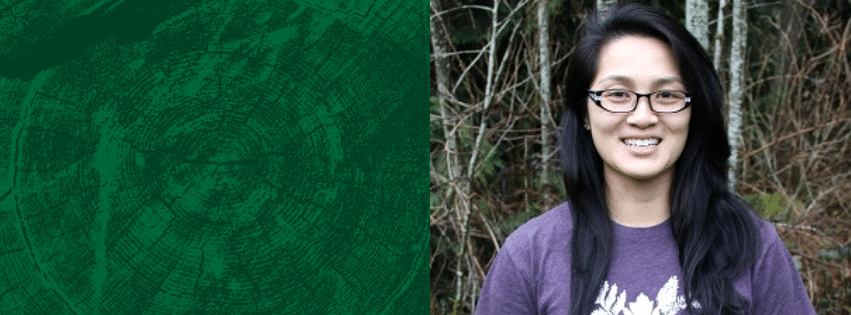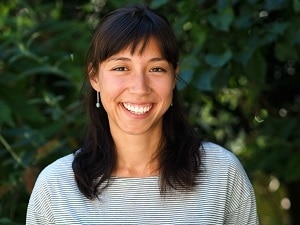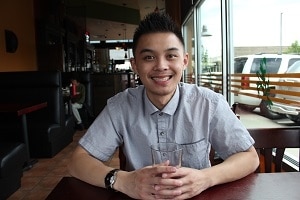If you look at the leaves of the salmonberry, a plant that thrives in the…
Author: Tamar Kupiec
The first time Tiffany Chan came to IslandWood she was a ten-year-old girl from Wing Luke Elementary taking part in the School Overnight Program (SOP). With her classmates she trekked through dense forest and crouched by Mac Pond; she peered under rocks and dragged nets through water. Tiffany hasn’t left IslandWood.
Today, she is a 25-year-old with a degree in Environmental Science from the University of Washington and twelve years of experience in conservation and environmental activism. As a leader with Environmental Professionals of Color, Tiffany works with staff at IslandWood to improve access to outdoor education and to address racial inequity in the environmental movement. What happened in between is the story of how a child’s interest in nature, when encouraged and deepened, can open up a world of study, work, and purpose. IslandWood was a part of this process.
Tiffany grew up in the Beacon Hill neighborhood of Seattle, in a house with front and back yards and gardens tended by her mother. Asian pear trees grew in the yard, and Tiffany would eat the fruit and enjoy it all the more knowing it sold for a high price at neighborhood markets. She did not call herself an environmentalist, but looking back, the values of her family and community have much in common with what she saw at IslandWood and with the environmental stewardship she practices today. Her parents taught her to treat her home and community with respect and to never waste. Food was not to be thrown away; plastic containers were reused. Tiffany recalls scraping off her plate in the IslandWood dining hall, where the students weighed and recorded food waste after each meal. For the first time, she could see in that bucket filled with bread crusts and half-eaten apples the cumulative effect of waste. An environmental consciousness was awakening.
A few years after SOP, Tiffany joined ZooCorps at Woodland Park Zoo, where she educated the public about conservation and animals. She admits with a smile that she signed up because she wanted to make new friends—and maybe even ride a tiger. Back then the term “climate change” was not part of her vocabulary. She stayed for nine years, eventually becoming a program coordinator. When she left, she appreciated not only the splendor of the tiger, but also the effect of habitat loss on its survival.
Today she works at EarthCorps. She helps coordinate the leadership training program, which brings young people from all over to the world to Puget Sound to work on restoration projects. Her understanding of environmentalism has evolved over the years. It’s about much more than saving trees and pitching in at the neighborhood park. It’s about creating a just and sustainable world. She can talk climate change, for sure, as well as green jobs and weatherization. And she can discuss the policy decisions that too often place waste plants and factories in low-income and minority communities.
It’s been fifteen years since Tiffany took part in the School Overnight Program, but she can still recall the way IslandWood made her feel—the thrill of exploration and the sense of safety and comfort. “I love rocks and dirt,” Tiffany says, but that doesn’t mean she wants them in her room at night. The large and inviting lodges, so unlike the big boxy buildings of the city or rustic cabins she had seen before, inspired feelings of wonder. And their cleanliness put her at ease. She came prepared as best she could, but it was a raincoat provided by IslandWood that kept her dry. She hiked and studied in the wilds of IslandWood without holding back, knowing she would return to the quiet space of the lodge at the end of the day.
Tiffany is the baby in an Asian-American family and the only girl. Although her parents encouraged her to keep up with her older brothers, they also urged her to stay on the path, not to run, and to keep her hands clean. SOP was the first time she would sleep away from home on her own, and so her mother accompanied her as a chaperon. No doubt, like her daughter, she was pleased to see that the children took their boots off before entering the lodges. After all, at the annual family camping trip sponsored by Boeing where her father worked, the Chans washed their feet before they entered the tent and brought hand sanitizer on their hikes.
“The natural world for me is understanding that things are connected and that with every action there’s a reaction,” says Tiffany. As a child she turned over a rock to observe the bugs underneath and realized that if she left it that way, she would destroy their home. At IslandWood she ran with her friends in the meadow outside their lodge and watched the grassy field turn to mud. The journaling and drawing she did at IslandWood, something she had not done much of in school, focused her powers of observation and helped her make these connections. Tiffany remains a woman of action—a true activist. She is a natural explorer, an advocate for Seattle’s diverse communities, and a protector of its natural resources.










